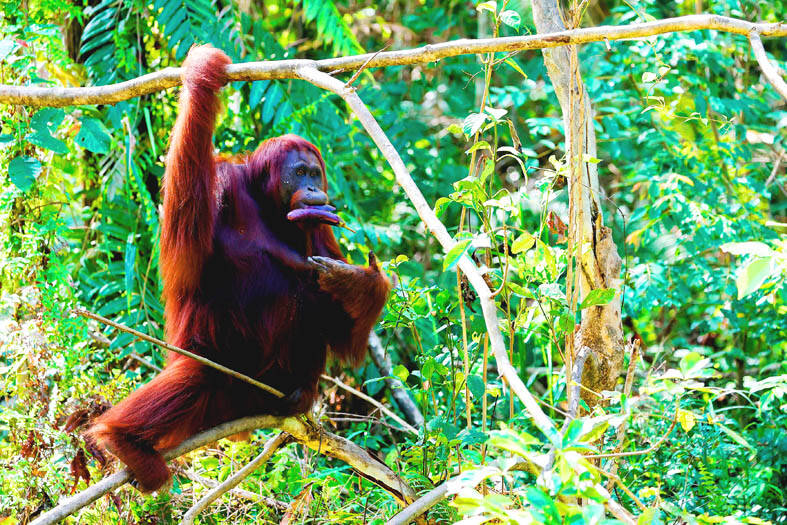Just outside Indonesia’s planned new capital on Borneo, an orangutan catches a banana with one hand, thrown by a conservationist on a boat, while her other hand clings to a tree branch.
She is one of 127 orangutans that the Borneo Orangutan Survival Foundation (BOSF) is caring for in the Samboja District of East Kalimantan Province. They have lost their homes due to deforestation, often linked to coal mining, and palm oil and timber plantations.
The giant apes could face an even bigger threat as Southeast Asia’s largest country builds from scratch Nusantara — a US$32 billion city.

Photo: Reuters
The government has promised to protect wildlife and undertake major reforestation in parts of the capital, which has been marketed to investors as a smart and green city.
Environmentalists are wary that construction in an area spanning nearly 260,000 hectares — almost four times the size of Singapore — would disturb some of Borneo’s endemic fauna, including endangered long-nosed monkeys, Irrawaddy dolphins and orangutans.
“Our biggest concern is Balikpapan Bay will turn into a giant pond, a place for residual waste from Nusantara’s activities,” said Mappaselle, a director with local environment group Pokja Pesisir.
About 400 hectares of mangrove forests along the coastline of Balikpapan Bay have already been cleared, to make way for a coal port and oil refinery, the group said.
He feared more could be razed when a new toll road is built connecting Nusantara to the nearest city of Balikpapan, as well as a port to bring in construction materials.
The Nusantara Capital City Authority said that mangroves would be replanted in other areas and guidelines have been made for workers encountering an animal.
“It’s a very high concern of how we’ll try to have harmony between people, nature and culture ... because that’s the soul of the city,” Nusantara Capital City Authority head Bambang Susantono said.
Foundations are being laid for government buildings. Later this year, homes are to be built for 16,000 civil servants, military and police officers due to move in next year.
For now, conservationists hope the government stays true to its pledge to care for animals.
“We hope that with the capital city being here, we can pave the way for animals to live side by side [with humans],” BOSF manager Aldrianto Priadjati said.
“At least provide an area for orangutans so they can live a better life,” Priadjati added.

The death of a former head of China’s one-child policy has been met not by tributes, but by castigation of the abandoned policy on social media this week. State media praised Peng Peiyun (彭珮雲), former head of China’s National Family Planning Commission from 1988 to 1998, as “an outstanding leader” in her work related to women and children. The reaction on Chinese social media to Peng’s death in Beijing on Sunday, just shy of her 96th birthday, was less positive. “Those children who were lost, naked, are waiting for you over there” in the afterlife, one person posted on China’s Sina Weibo platform. China’s

‘POLITICAL LOYALTY’: The move breaks with decades of precedent among US administrations, which have tended to leave career ambassadors in their posts US President Donald Trump’s administration has ordered dozens of US ambassadors to step down, people familiar with the matter said, a precedent-breaking recall that would leave embassies abroad without US Senate-confirmed leadership. The envoys, career diplomats who were almost all named to their jobs under former US president Joe Biden, were told over the phone in the past few days they needed to depart in the next few weeks, the people said. They would not be fired, but finding new roles would be a challenge given that many are far along in their careers and opportunities for senior diplomats can

RUSHED: The US pushed for the October deal to be ready for a ceremony with Trump, but sometimes it takes time to create an agreement that can hold, a Thai official said Defense officials from Thailand and Cambodia are to meet tomorrow to discuss the possibility of resuming a ceasefire between the two countries, Thailand’s top diplomat said yesterday, as border fighting entered a third week. A ceasefire agreement in October was rushed to ensure it could be witnessed by US President Donald Trump and lacked sufficient details to ensure the deal to end the armed conflict would hold, Thai Minister of Foreign Affairs Sihasak Phuangketkeow said after an ASEAN foreign ministers’ meeting in Kuala Lumpur. The two countries agreed to hold talks using their General Border Committee, an established bilateral mechanism, with Thailand

Australian Prime Minister Anthony Albanese yesterday announced plans for a national bravery award to recognize civilians and first responders who confronted “the worst of evil” during an anti-Semitic terror attack that left 15 dead and has cast a heavy shadow over the nation’s holiday season. Albanese said he plans to establish a special honors system for those who placed themselves in harm’s way to help during the attack on a beachside Hanukkah celebration, like Ahmed al-Ahmed, a Syrian-Australian Muslim who disarmed one of the assailants before being wounded himself. Sajid Akram, who was killed by police during the Dec. 14 attack, and